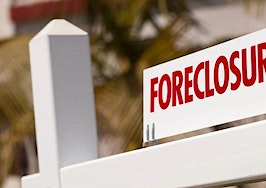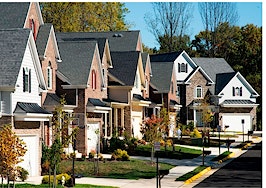New markets require new approaches and tactics. Experts and industry leaders take the stage at Inman Connect New York in January to help navigate the market shift — and prepare for the next one. Meet the moment and join us. Register here.
Recent home price declines in many markets have left about 450,000 homeowners underwater without doing much to ease affordability issues, according to numbers released Monday by data and analytics provider Black Knight.
Six out of 10 borrowers who are underwater — meaning they owe more on their mortgages than their homes are worth— bought or refinanced their homes in 2022, according to the latest Black Knight Mortgage Monitor.

Ben Graboske
“Though the home price correction has slowed, it has still exposed a meaningful pocket of equity risk,” Black Knight Data & Analytics President Ben Graboske said in a statement.
While negative equity rates are “far below historical averages,” Graboske said “a clear bifurcation of risk has emerged between mortgaged homes purchased relatively recently versus those bought early in or before the COVID-19 pandemic. Risk among earlier purchases is essentially nonexistent given the large equity cushions these mortgage holders are sitting on. More recent homebuyers don’t fare as well.”
Negative equity share by year loan was originated

Among the 450,000 homes that Black Knight estimates were underwater as of Sept. 30, 250,000 were owned by borrowers who purchased in 2022. Roughly 5 percent of homes purchased or refinanced this year are underwater and another 19 percent have less than 10 percent equity.
By comparison, only 1 percent of homes purchased or refinanced in 2021 are underwater, while 3 percent have less than 10 percent equity.
All told, Black Knight estimates about 1 million homeowners have limited equity in their homes or less than 10 percent.
Homeowners with little or no home equity are at higher risk of foreclosure if they encounter financial difficulties like job loss or health issues, because it’s harder for them to pay off their mortgages by selling their homes.
“Low or negative equity may have a marginal effect on mortgage performance in the near term, but these borrowers tend to be more susceptible to financial stress and may face additional challenges under a prolonged economic downturn,” Black Knight warned.
At 0.84 percent, negative equity rates among all mortgaged properties remain “extremely low” by historical standards, Black Knight noted. But homebuyers with FHA and VA mortgages are more likely to be skating on thin ice since they can purchase homes with little or no money down.
Black Knight’s data shows more than 20 percent of homebuyers who took out FHA or VA purchase mortgages this year are underwater and two-thirds have less than 10 percent equity.
Early-payment defaults among FHA borrowers who miss a payment within six months of taking out a loan are on the rise and now exceed pre-pandemic levels.
While that could be an early indication of more trouble ahead, the national delinquency rate remains well below the historical average of 4.54 percent.
National delinquency rate

The national delinquency rate for first mortgages was up 12 basis points from September to October to 2.91 percent. But Hurricane Ian appears to have driven about one-third of that increase, with delinquencies in Florida up 53 basis points to 3.42 percent.
Home price declines from 2022 peak by market

Source: Black Knight Home Price Index
At the market level, home price declines have shifted from west to east and from “chronically unaffordable markets toward pandemic boomtowns,” with 80 percent of major markets having begun to see prices fall from peaks, Black Knight noted.
The share of underwater homes in each market varies considerably, and recent price corrections aren’t the only variable, Black Knight reported.
Share of mortgaged homes with negative equity by market

While San Jose, California has seen prices decline as steeply as any market, only 2.4 percent of homes purchased this year are underwater. That’s because homebuyers tend to rely on jumbo mortgages requiring large down payments, Black Knight noted.
But in markets like Colorado Springs, Colorado and Honolulu, more than 30 percent of homes purchased in 2022 are now underwater, thanks in part to high concentrations of VA loans, Black Knight said.
National payment-to-income ratio near 40-year high

While mortgage rates have come down a bit in the last few weeks, the pace of price declines has slowed considerably and housing affordability remains near a multi-decade low, Black Knight said.
“Though seemingly counterintuitive, the much higher rate environment may be limiting the pace of price corrections due to its dampening effect on inventory inflow and subsequent gridlock in home sale activity,” Graboske said.
At 37.4 percent, the share of median income needed to make monthly principal and interest payments on the average home remains “uncomfortably close to the nearly 40-year high,” Black Knight warned.
According to Black Knight, six of the nation’s 10 least affordable markets are in California.
Top 10 least affordable markets (payment-to-income ratio)
- Los Angeles, California (73.6 percent)
- San Diego, California (65 percent)
- San Jose, California (63.3 percent)
- San Francisco, California (57 percent)
- Las Vegas, Nevada (53.8 percent)
- Miami, Florida (51.9 percent)
- New York-Newark, New York-New Jersey (49.5 percent)
- Riverside, California (48.7 percent)
- Seattle, Washington (47.9 percent)
- Sacramento, California (46.5 percent)
All of the nation’s 10 most affordable markets are on or east of the Mississippi River.
Top 10 most affordable markets (payment-to-income ratio)
- St. Louis, Missouri (24.5 percent)
- Detroit, Michigan (25 percent)
- Cleveland, Ohio (25.7 percent)
- Kansas City, Missouri (25.9 percent)
- Pittsburgh, Pennsylvania (26 percent)
- Cincinnati, Ohio (26.1 percent)
- Chicago, Illinois (26.3 percent)
- Louisville, Kentucky (27.3 percent)
- Milwaukee, Wisconsin (27.4 percent)
- Baltimore, Maryland (28 percent)
Inventory of homes listed for sale

Listing shortages are keeping home prices from falling more dramatically in many markets. At the national level, three months of stalled inventory growth continued in October, with the volume of new for-sale listings down 19 percent from pre-pandemic levels.
While listings were down 40 percent from historic norms in October — a deficit of about 511,000 homes — that’s a slight improvement from September’s 43 percent deficit. Months of inventory ticked up from 2.9 to 3.1, and homebuyer demand also fell.
“This marks the largest deficit in six years outside of March and April 2020 when much of the country was in lockdown — with the overall market still more than half a million listings short of what we’d consider ‘normal’ by historical measures,” Graboske said.
Fannie Mae forecasters don’t see home sales rebounding until 2024 and are warning that the “lock-in effect” — the financial disincentive for existing homeowners to put their homes on the market, move and take on a new mortgage — could dampen the strength of the recovery.
Get Inman’s Extra Credit Newsletter delivered right to your inbox. A weekly roundup of all the biggest news in the world of mortgages and closings delivered every Wednesday. Click here to subscribe.













